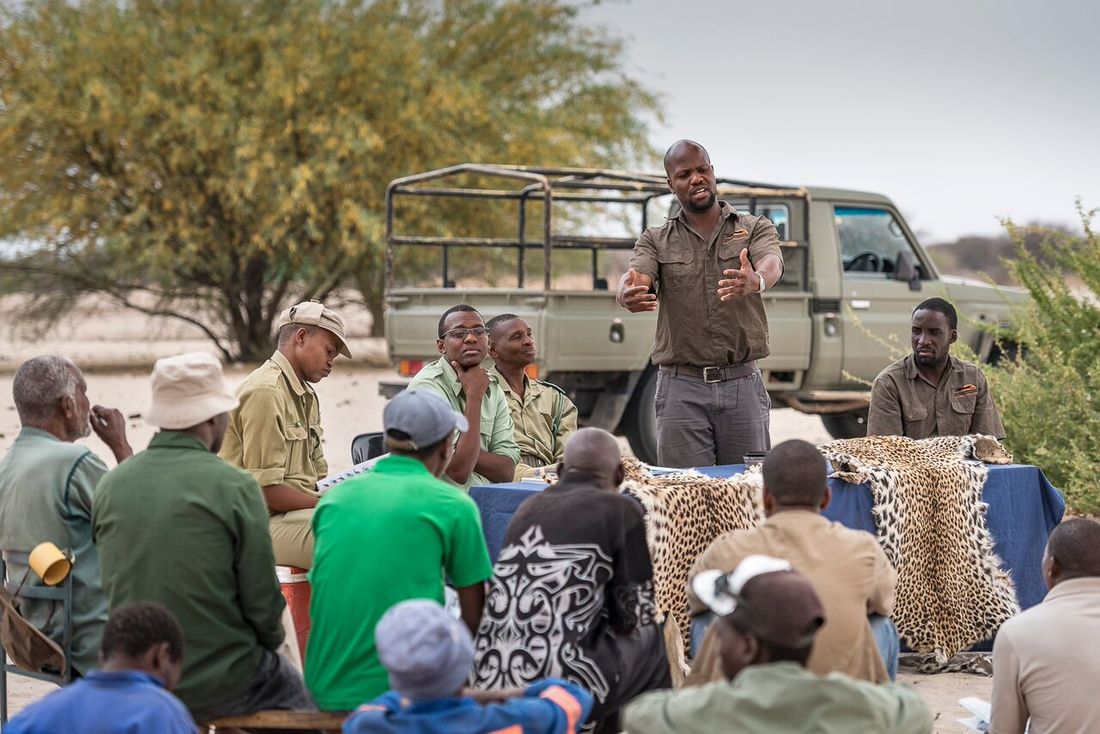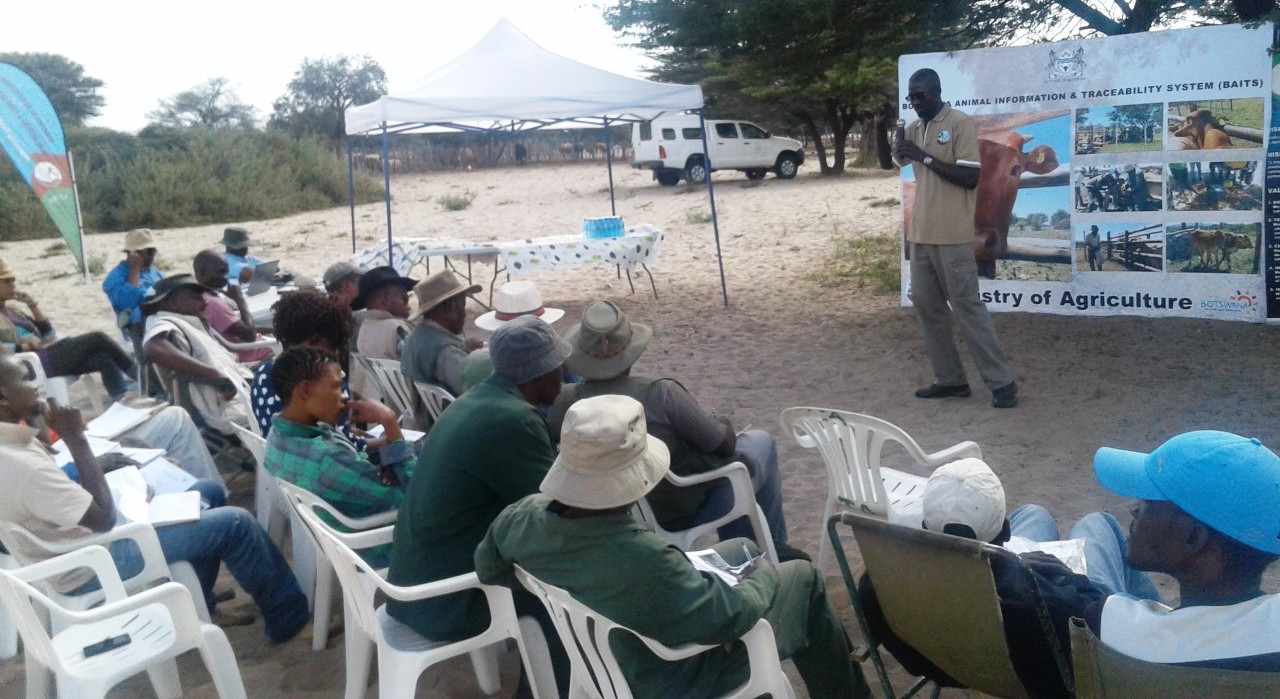This trip provided a fun way for farmers to learn more about the commercialization of their farming practices and we commend the network for being so committed to learning. We hope that with their newfound knowledge they will move towards a future of prosperity and coexistence with cheetahs.
|
Cheetah Conservation Botswana (CCB) has been instrumental in establishing farmers’ networks in areas where cheetahs thrive. These networks provide farmers with a useful avenue to discuss management methods, challenges and developments, all of which can have a significant impact on the wildlife that live in their areas. On the 27th May, the Southern Livestock Farmers Network (SOLIFANE) members, along with CCB staff attended the Southern District Beef Farmers Association annual field day. The theme of the day was ‘Evolving Towards Beef Sector Commercialisation’ and the bench marking trip provided the team with an opportunity to learn, experience and understand what it takes to venture into commercial farming. By helping farmers improve the productivity of their farming enterprises, CCB can help to safeguard communities against the pressures associated with farmer-cheetah conflict. For example, a farmer with only five goats is much more likely to be hard-hit by the loss of one goat to cheetahs, whereas a farmer with 100 goats will generally be less inclined to retaliate from the loss of only one animal. This trip provided a fun way for farmers to learn more about the commercialization of their farming practices and we commend the network for being so committed to learning. We hope that with their newfound knowledge they will move towards a future of prosperity and coexistence with cheetahs.
0 Comments
We are excited to announce that CCB received a Disney Conservation Fund Award for 2016-2017, as a part of the fund’s focus on reversing the decline of at-risk wildlife around the world. This conservation grant recognizes our Livestock Guarding Dog (LGD) programme and other community outreach activities. Through these activities, we are able to provide further opportunities for the rural farming communities in Botswana to protect their livelihoods while conserving carnivore populations by imparting technical advice and training on various tools that can be used to control depredation.
The Disney Conservation Fund (DCF) focuses on reversing the decline of wildlife. Since its inception in 1995, DCF has provided approximately $65 million to support conservation programs in 115 countries. Projects were selected to receive awards based on their efforts to study wildlife, protect habitats and develop community conservation and education programs in critical ecosystems around the world. For information on Disney’s commitment to conserve nature and a complete list of grant recipients, visit www.disney.com/conservation The event was held in Gaborone on the 13th May 2017, organised by The Culturati, a local culture and tourism magazine under the theme, The Last Kgori Standing, the Kgori Bustard being Botswana national bird. Similar to chess, Mhele is a traditional game played by two players and it is a game of discipline. Mhele was chosen as the game of the day since it was noted that its one of the many traditional games that are dying out. The event was also supported by Botswana National Museum, Botswana Traditional Games Association, Birdlife Botswana and the Director, Dr. Kabelo Senyatso gave a tantalising speech on birds in Botswana and how they have always been related to culture. He emphasised the need to conserve birds, identified few business opportunities from birds such as bird tourism, and shared that we have about 600 species of birds locally, with 30 species threatened, including the Kgori. 32 players that came to play the Mhele game during the day and the winner was named after the theme of the day....The Last Kgori Standing. Other organisations, individual, private and government departments exhibited at the show and people came out in numbers to support the event. CCB hosted an information stall to share conservation news with those that came to our stall and the day was fun filled with engaging and exciting discussions.
The Ghanzi Department of Veterinary Services (DVS) held a workshop at Lekanyane cattle-post on the 8th May 2017 to continue the roll out of qualifying and certifying communal farmers in the Ghanzi area for access to European Union market. Botswana Animal Information and Traceability System (BAITS) coordinator, Dr. Babayani mentioned that their department has guidelines on how communal farmers can access and sell their produce directly to the EU market without going through the feedlots. The redefined guidelines requires a farmer to clock all cattle husbandry management practices including watering, kraaling, milking and vaccination to qualify for EU market. Dr. Babayani said that the initiative would be preliminary rolled out first to some few farmers identified in the region and after implementing the guidelines, EU would be informed so that they could audit it with a view to agree and modify it to their preference as they are the ones who prescribed the requirements. Dr. Babayani is confident that the new guidelines would satisfy the EU market requirements and stated that their hope is that once these farmers have qualified, their productivity will increase and the initiative will be rolled out to the whole district and substantially the whole country. “Firstly, I thank CCB for making this trip a reality. I had an exciting opportunity to learn and understand more about BAITS. The biggest advantage about BAITS is that farmers will have a major responsibility for their cattle when comes it selling them. This sounds good because the guidelines qualifying communal cattle farmers to the EU market doesn’t require them to change the way they have been doing things, they are only expected to register a holding such as water point, kraal and ear tagging of all cattle at this registered holding and to document the husbandry management activities. This is a very good initiative and we are welcoming it with hands wide open, ‘’ states Ofeletse Thaushe – Ghanzi Small Stock Farmers Network.
|
SearchArchives
May 2024
Categories |






 RSS Feed
RSS Feed
